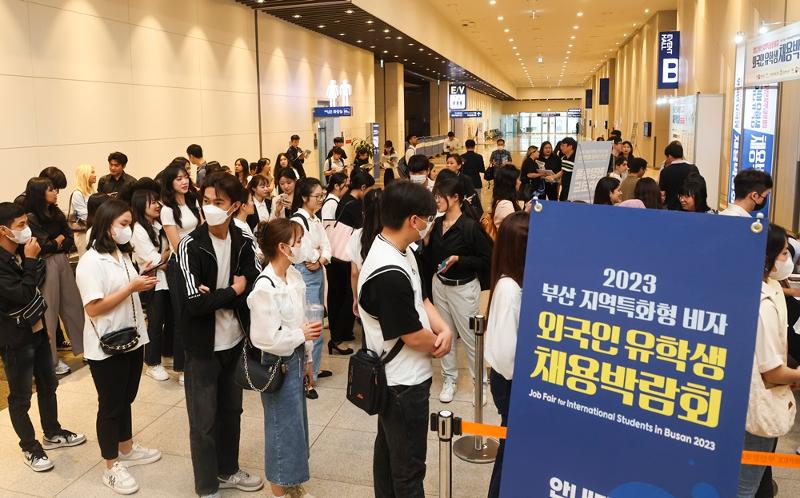
People in July last year wait to enter a job fair for foreign students at the Busan Port International Exhibition and Convention Center, aka BPEX, in Busan's Dong-gu District. (Yonhap News)
By Lee Jihae
The launch of "top-tier" and "youth dream" visas seek to attract high-level foreign workers in cutting-edge sectors.
International students will also get a longer period to look for jobs after graduation and a wider scope of occupations to choose from.
The aim of this visa reform is to secure 100,000 or more professional and skilled workers within five years.
The Ministry of Justice on Sept. 26 announced a plan on a new immigration policy with the following main objectives: opening the door to wooing top talent; visa governance reflecting the needs of local governments and the private sector; strengthening integration of immigrants in society; and adoption of a scientific and institutional system for foreign labor introduction.
To attract bright minds in next-generation fields like artificial intelligence, robotics, quantum technology and aerospace, the top-tier visa will offer convenience to such personnel and their families in entry and departure from Korea and residence.
To expand global exchange among the younger generation, the Youth Dream in Korea Visa will allow young people from United Nations member countries that took part in the Korean War and main economic partner states to work and experience culture in Korea.
International students will also get more time to pursue careers in the country through internships and other pursuits after graduation. Their range of job opportunities will also be expanded to non-specialized fields.
Foreign youth including second-generation immigrants can switch to work visas after finishing high school even if they do not attend college.
Foreign nationals planning to stay long term in Korea can get social integration education even before their arrival for early adaptation to the country. The ministry plans to reinforce customized training for them after their arrival.
Minister of Justice Park Sung Jae said, "We will attract immigrants necessary for our society and create a structure in which they become self-independent members of the community and contribute to Korean society."
jihlee08@korea.kr